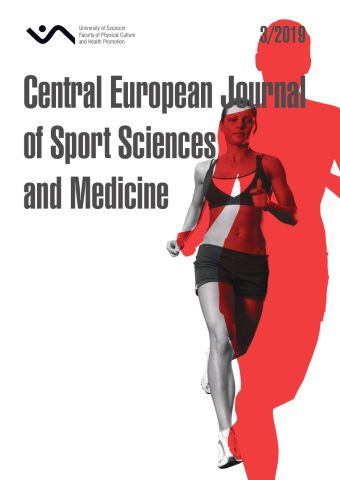
ISSN: 2300-9705
eISSN: 2353-2807
OAI
DOI: 10.18276/cej.2019.3-01




Issue archive /
Vol. 27, No. 3/2019
A study of the cognitive level and some basic skills in basketball among secondary students according to gender and intelligence variables
| Authors: |
Ahmed
Ahcene
Djamel Mokrani Houcine Benzidane |
| Keywords: | cognitive level some basic skills in basketball secondary students intelligence variables |
| Data publikacji całości: | 2019 |
| Page range: | 12 (5-16) |
Abstract
The curriculum of physical education and sports through sports activities programmed in the secondary stage seeks to achieve a set of goals of mobility, cognitive and social emotional to serve the goals of physical education and sports at this stage, and we find the basketball game one of these activities, which need a degree of intelligence and knowledge that helps in Developing the skill level of the students and selecting the teacher for the appropriate exercises to teach the different basic skills. In this context, our study aims to measure the cognitive level of the students of the third secondary level as well as their level in some basic skills The study was conducted using a cognitive test in basketball and the selection of some technical tests according to the objectives of the curriculum, then comparing the level according to the sex variables and the level of intelligence and interaction between them and identifying the relationship between these variables. One of the students of the third year secondary school in city of Mostaganem (Algeria), and after the statistical treatment of the results was reached the results of the most important:
- The absence of a gender effect and the level of logical and physical intelligence and interaction between them at the cognitive level while being influenced by the level of space intelligence in favor of those with high intelligence.
- There is a difference in the level of skill of pointing, scrolling and dialogue for the benefit of males, and there is no impact on the level of intelligence, whether logical or physical or space.
- There is an impact of the interaction between sex and the level of spatial intelligence at the cognitive level, where males and females with high intelligence showed more response
- The interaction of sex and the level of intelligence, whether logical, physical or spatial, has no impact on the skills of correction, scrolling and dialogue
- There is a direct correlation between IQ and cognitive level as well as basic skills in basketball
Download file
Article file
Bibliography
| 1. | Abdul Sattar Jabbar. (2011). Mathematical Intelligence. Amman: Zahran Publishing House. |
| 2. | Amin Anwar Al-Khouli. (1990). Sport and society. Cairo: The World of Knowledge Series. |
| 3. | Amin al-Khuli, Mahmoud Adnan. (1990). Physical Education School. Cairo: Arab Thought House. |
| 4. | Armstrong(2008).multiple intelligence in the classrom.alexandria.assciation for prevision and curriculum developement.arbor.michighan.USA. |
| 5. | Cabrini, M. (1999). The Psychology of Soccer. Spring City, PA: Reedswain. |
| 6. | Coakley, J. (1997). Sport in Society: Issues and Controversies. 5th Edition, Times Mirror/Mosby College, |
| 7. | Erlbaum. Eccles, J. S. and Harold, R. D. (1991). “Gender differences in sport involvement: Applying Eccles’Expectancy-Value Model”, Journal of Applied Sport Psychology, 3, 7-35. |
| 8. | Gardner, H,(1997). Multiple intelligences as partner in school improve Educational leader ship,55, (1). |
| 9. | Gardner, (1999) intelligence – Reframed – Multiple – intellgences for the 21st century.NewYourk Basic books |
| 10. | Hara. (1975). Origins of Sports Training (Version 01). (Abdel Ali Nasif, Translators) Mosul: Dar Maaref. |
| 11. | Huffman and others,(1996). psychology in Action Intelligence and intelligence testing New York. |
| 12. | Jaber Abdul Hamid Jaber. (1979). Education and education technology. Cairo: Arab Renaissance House. |
| 13. | Kleingeld, A., Mierlo, H., & Arends, L. (2011). The effect of goal setting on group performance: A meta-analysis. Journal of Applied Psychology, 96(6), doi: 10.1037/a0024315 |
| 14. | Kyllo, L.B., & Landers, D.M. (1995). Goal setting in sport and exercise: A research synthesis to resolve the controversy. Journal of Sport and Exercise Psychology, 17, 117 – 137. |
| 15. | Lindley, L.d, (2001) Personality and unpublished human ph.d. thesis,university of lows : Availablestate ,www.lip.umi. Com / dissertation. |
| 16. | Mohammed Al-Hamahmi Amin Al-Kholi. (1990). The foundations of building sports education programs. Cairo: Arab Thought House. |
| 17. | Mohammed Subhi Hassanein. (1995). Measurement and Evaluation in Physical Education and Sports. Cairo: Arab Thought House. |
| 18. | Morgan, H. (1992). Analysis’s of Gardner's theory of multiple Intelligence. the Anmal meeting of the eastern educational, research Association-. |
| 19. | Rejoice of Mr. Layla. (2001). Mathematical cognitive measurement. Cairo: Dar Al Ma'aref. |
| 20. | Shebenou, R. J. Johnsen, S. K. (1990). Test of Nonverbal Intelligence: A Language-free measure of cognitive ability, examiner’s manuel Second Edition. Austin, Texas: Pro-ed. |
| 21. | Weinberg, R. Gould, D. (2003). Foundations of Sport and Exercise Psychology, 3rd. Edition. IIIinois: Human Kinetics, p. 222-223. |
| 22. | Yperen, N.W. V., Blaga, M., & Postmes, T. (2014). A Meta-Analysis of Self-Reported Achievement Goals and Non-self-Report Performance across Three Achievement Domains (Work, Sports, and Education). PLoS ONE 9:e93594. 10.1371/journal.pone.0093594. |
| 23. | Yukelson, D. (1998). Communicating effectively. 3RD. Edition. In. J. Williams (Ed.). Sport Psychology: Personal growth to peak performance. CA: Mountain View, Myfield, pp. 142-157. |